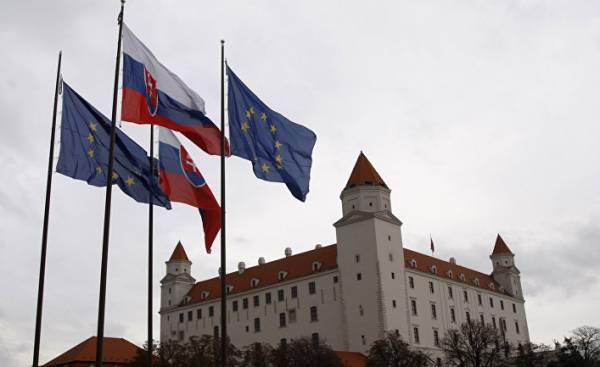
In many ways, Slovakia is an exemplary example of the integration of Eastern European countries into the European Union. However, the strike, which began at the Volkswagen plant in Bratislava, can tell a lot about how divided Europe is, if you look at it from its Eastern edge. People from Eastern Europe can often think that their country turned into a colony of Western Europe, and this feeling may be a more serious threat to the unity of the EU than Brickset.
Unlike most of its neighbors almost painless Slovakia switched to the Euro contrary to the predictions of many experts. From 2010 to 2016, the performance of its economy in constant prices grew on average by 2.9% per year. This impressive growth was possible thanks to the fact that Slovakia quickly gained the EU status of center of vehicle Assembly.
In 2005, Slovakia produced about 200 thousand vehicles per year. In the last two years, the number of produced cars exceeded a million. According to the Organization for economic cooperation and development on Wednesday, June 21, published a detailed report on the state of economy of the Slovak Republic, the sector accounts for 40% of industrial output, one third of the export (that goes mainly to other EU countries) and only 4% value added: Slovakia is deeply integrated into a vast and ultra-fast production chain the European automotive industry.
In the West, where most of the factories, the unemployment rate is less than 5%, and the workers feel the need to fight for their rights. They compare themselves with workers performing the same job in Western Europe, and even with the workers of the richer East of the country, and they have the impression that they are treated unfairly. Zoroslav Smolinsky (Zoroslav Smolinsky), head of the trade Union Committee at Volkswagen in Bratislava, recently wrote in his article that although the workers of these factories make decent money by the standards of Slovakia, their wages do not go to any comparison with salaries in the Central plant of Volkswagen in Wolfsburg, Germany, and it is unfair. Indeed, the average salary at the plant in Wolfsburg is about 2.5 times higher than the average salary at the plant in Bratislava. (It should be noted that the expenses of inhabitants of Wolfsburg is also higher than the cost of the inhabitants of Bratislava, but this is usually no one mentions.)
Slovak workers automobile factories are collected not only by relatively cheap cars Up! but ultraderecha models such as the Porsche Cayenne and Bentley Bentayaga. Expensive cars profit growth of the company Volkswagen, and these cars work Bratislava refused to collect when Tuesday, June 20, they went on strike, rejecting a management offer of a wage increase of 4.5% (they insist on 16%).
And it’s not a common action of the workers of an industrial enterprise. A populist leader of Slovakia, Prime Minister Robert Fico (Robert Fico), strongly supported the workers. His characterization of the conflict, which he announced Tuesday, June 20, was even more sharp than the feature of the head of the trade Union Committee Smolinsky:
Our Western friends do not understand us when we ask them why working in Bratislava — the working of the company, which is famous for the highest quality and performance and produces the most luxurious cars — receives a salary, which is only half or maybe two thirds of the salary of the worker of the same company in the enterprise 200 miles West or any other Western country, where lower quality products and lower productivity.
Such a position is characteristic not only of Slovakia. The people of Eastern Europe feel that their Western neighbors, they deprive. They accuse multinational companies that sell a cheaper and low-quality variants of their products in their countries. They argue that the European Union, distributing funds from the so-called funds of solidarity in post-Soviet countries-EU members, helps Western corporations in the same — if not greater — extent as poorer countries. Zoltan Kovacs (Kovacs Zoltan), representative of the government of Hungary, wrote recently in his letter addressed to the editor of Politico:
In exchange for funds from the funds of solidarity with less developed member countries of the European Union have opened their markets to companies from other EU countries. As a result of this agreement many German companies managed to earn very well, taking advantage of unlimited access to new markets, new sources of skilled labor, and in the case of Hungary — to the lowest tax on profits of enterprises in the EU — only 9%.
Slovakia, Poland, Hungary, the Czech Republic and Slovenia joined the European Union 13 years ago. Many claim that they managed to pass a very long way in a relatively short time and need to keep patience to achieve the standards of life which were formed in the West for more than half a century. But their inhabitants have long forgotten its Communist past, and now they only see what the standard of living in their countries is far below the standard of living in key EU member States. If we talk about income, Eastern European countries are now gradually catching up with Spain, but not Germany.
In response, Western Europeans indicate that the cost of labor in Eastern Europe is growing faster than in Western, and in this sense less developed members of the European Union is rapidly catching up with its leaders.
But while these arguments do not work. Because Eastern Europeans are increasingly tired of his position of “poor relatives”, they are increasingly make a choice in favor of populist parties advocating the strengthening of national sovereignty. Such forces have come to power in Hungary and Poland.
In response, key members — primarily France and Germany — increasingly advocate the concept of so-called “dvustoronniy” Europe, where some members integrate their legal and economic systems faster than others. From the point of view of Western Europe, it has a specific meaning, but such a concept is unacceptable to the Eastern Europeans. That is why many are increasingly saying that Germany enjoys too much influence in Eastern Europe, especially in Poland.
Eastern Europe risks going too far in their demands. If the company Volkswagen will accept the fact that the cost of labor at its plant in Bratislava is scheduled to coincide with labor costs at factories in Germany — and they are already moving in this direction — she eventually becomes unprofitable to move production of highly profitable products in Eastern Europe. The economic recovery of Eastern Europe after the fall of communism was largely due to the very corporations that they now criticize.
However, the West also needs to play his cards carefully. Populists in Eastern Europe may be very sensitive to criticism and economic sanctions. However, they hardly begin to lose ground as fast as it happened with the populists in Western Europe — if only East Europeans do not get rid of your set of colonies or if they do not see tangible signs of economic convergence. It would be unwise to give them more reasons to riot. As shown by the results of a study carried out recently at Chatham House, solidarity with the weaker in economic terms countries is a key value of the European Union: 77% of the European elites (that is, “individuals in positions of influence”) and 50% of the public believe that richer members of the EU should provide financial support to poorer countries.
Integration was and remains a worthy goal. Therefore, governments of EU countries should not lose sight of her.







